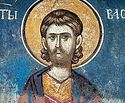

| Previous day | Next day |
| Old Style
May 22
|
Saturday |
New Style
June 4
|
| 6th Week after Pascha. Tone 5. | No fast.
|
![]() Martyr Basiliscus the Soldier, of Comana (308). St. John Vladimir, martyr and ruler of Serbia, whose relics are at Elbasan (1015). Blessed James of Borovichi (Novgorod) (ca. 1540).
Martyr Basiliscus the Soldier, of Comana (308). St. John Vladimir, martyr and ruler of Serbia, whose relics are at Elbasan (1015). Blessed James of Borovichi (Novgorod) (ca. 1540).
Commemoration of the Second Ecumenical Council (381).
New Hieromartyr Maxim (Zhizhilenko), bishop of Serpukhov (1931). New Hieromartyr Michael Borisov, archpriest, of Uglich (1942).
Righteous Melchizedek, king of Salem (ca. 2000 b.c.). Hieromartyrs Donatus, bishop of Thmuis, the priest Macarius, and the deacon Theodore (ca. 316). New Hieromartyr Zachariah, priest of Prusa (1802). New Monk-martyr Paul of Mt. Athos, at Tripolis, the Peloponnese (1818). Martyr Sophia the Healer.
Repose of Eldress Macrina of Volos (1995).
Thoughts for Each Day of the Year
According to the Daily Church Readings from the Word of God
By St. Theophan the Recluse

Saturday. [Acts 20:7–12; John 14:10–21]
And whatsoever ye shall ask of the Father in my name, that will I do (John 14:13). What a consoling promise! But how few make use of it! People rarely keep this in mind. There are people who do not understand this at all, and do not accept it. Why is this so? Because they do not love the Lord, and they do not fulfil His commandments. This unfaithfulness of the heart toward the Lord relinquishes any boldness to petition the Lord, just as a lazy servant does not dare ask something of his masters, for he knows that he does not deserve any mercy. The established prayers are read in their usual course, and they contain very great petitions; but they are merely read, and this, as we well know, is far from prayer and petitioning. We cannot stand with true prayer before the Lord and extend our petitions to Him until our conscience is clear before Him.
Articles
 Martyrs Eutropius and Cleonicus of Amasea, and Basiliscus of ComanaThe Holy Martyrs Cleonicus, Eutropius and Basiliscus suffered in the city of Pontine Amasea (Asia Minor) in about the year 308. |
 St. John-Vladimir the Prince of Bulgaria, the Greatmartyr and Miracle-workerThe Holy Martyr John-Vladimir, a Serbian prince, was born in the tenth century. |

